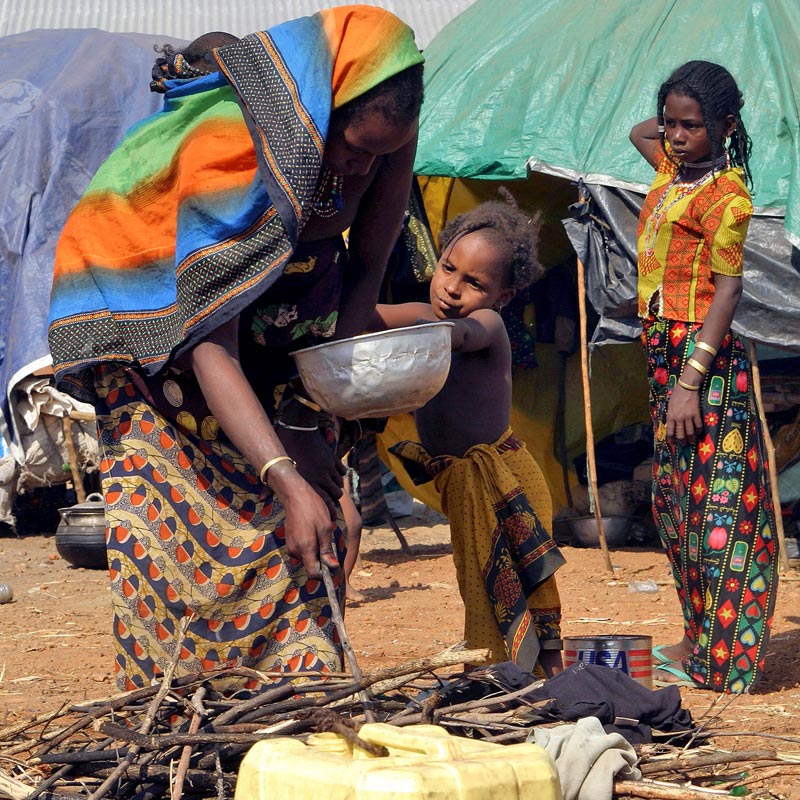-
Grants
42
-
Total Awarded
$23,750,424
-
Years
1984 - 2021
-
Categories
Grants
The Center for International Security and Cooperation (CISAC) at Stanford University conducts scholarly, policy-relevant research on international security issues, teaches Stanford undergraduates, and trains the next generation of security specialists to make original, policy-relevant, scholarly, contributions. This endowment award provides support for a nuclear policy fellow at CISAC every two years in perpetuity. Outcomes include a cohort of young scholars trained in nuclear policy, drawn from the natural sciences, engineering, law, and social sciences.
The Center for International Security and Cooperation is Stanford University’s hub for researchers tackling some of the world’s most pressing security and international cooperation problems. This award supports a United States-Russia project that examines the potential for nuclear flashpoint issues to escalate to a highly dangerous level. It also addresses measures to reduce the danger of nuclear conflict on the Korean Peninsula. By proposing recommendations to improve mutual understanding, the project aims to enhance strategic nuclear and regional stability, and reduce the danger of miscalculations and nuclear conflict.
The Center for International Security and Cooperation (CISAC) at Stanford University conducts scholarly, policy-relevant research on international security issues, teaches Stanford undergraduates, and trains the next generation of security specialists to make original, policy-relevant, scholarly, contributions. It is one of the Nuclear Challenge’s five nuclear policy education and training grantees. This award supports up to four fellows per year, a senior mentor with extensive policy experience, media training for the fellows and project-related administrative and research activities. Outcomes include a cohort of professionals equipped to lead the future formulation of nuclear policy and engage effectively in the public debate.
Founded in 1986, the Center for Security and International Cooperation (CISAC) is Stanford University’s hub for researchers addressing some of the world’s most pressing security and international cooperation problems. The award supports CISAC’s Nuclear Risk Reduction project, which seeks to make steady progress in reducing the greatest international nuclear risks and security challenges. It promotes progress in keeping nuclear weapons and materials out of the hands of terrorist and sub-national groups, preventing the proliferation of nuclear weapons, and mitigating the risks of the proliferation of weapons and technologies.
The Center for International Security and Cooperation (CISAC) is Stanford University’s hub for researchers tackling some of the world's most pressing security and international cooperation issues. This project surveys the American public about its support or opposition to a U.S. preventive strike and nuclear escalation scenarios on the Korean
peninsula. It is intended to inform U.S. policymakers and experts about how information about the benefits and risks of a preventive strike against North Korea and its potential human cost shapes the American public’s policy attitudes. It also intends to improve the quality of the public debate about how best to address the nuclear challenges presented by North Korea.The Center for International Security and Cooperation (CISAC) is Stanford University’s hub for researchers tackling some of the world’s most pressing security and international cooperation problems. This award supports a US-China-Russia-North Korea project that examines the potential for nuclear flashpoint issues to escalate to a highly dangerous level. By proposing recommendations to improve mutual understanding, the project aims to enhance strategic nuclear and regional stability and reduce the danger of miscalculations and nuclear conflict.
Founded in 1986, the Center for Security and International Cooperation (CISAC) is Stanford University’s hub for researchers addressing some of the world’s most pressing security and international cooperation problems. This award provides support for a two-year research, writing, and policy outreach project to better understand public and elite opinion about nuclear weapons use in the United States, Israel, and the United Kingdom. The research team designs and runs a set of survey experiments in each country focused on real world conflicts, publishes results, and briefs senior policy makers on the findings. Outcomes include an improved public understanding of nuclear risks and an ability to contribute to discussions and debates about nuclear weapons among policy makers.
Founded in 1986, the Center for Security and International Cooperation (CISAC) is Stanford University’s hub for researchers addressing some of the world’s most pressing security and international cooperation problems. The award supports CISAC’s Nuclear Risk Reduction project, which seeks to make steady progress in reducing the greatest international nuclear risks and security challenges. The primary focus is on three countries – Russia, China, and Pakistan – whose cooperation is essential in global nuclear risk reduction. It seeks to make progress in keeping nuclear weapons and materials out of the hands of terrorist and sub-national groups, and preventing the proliferation of nuclear weapons, and mitigating the risks of the proliferation of weapons and technologies.
The Center for International Security and Cooperation (CISAC) is Stanford University’s hub for researchers tackling some of the world’s most pressing security and international cooperation problems. The Project on Peace and Cooperation in the Asian-Pacific region consists of an annual conference on U.S.-China security and cooperation, and ongoing dialogues related to Northeast Asian security and geopolitics. The project aims to mitigate tension and increase mutual understanding between the United States and China on strategic nuclear issues, maritime instability off the western coast of the Korean Peninsula, and cybersecurity. This final, tie-off award supports CISAC’s Project on Peace and Cooperation in the Asian-Pacific Region, and closes the International Peace and Security program’s dedicated funding for Track 2 dialogues on general security issues.
The Center for International Security and Cooperation (CISAC) at Stanford University conducts scholarly, policy-relevant research on international security issues, teaches Stanford undergraduates, and trains the next generation of security specialists—pre- and postdoctoral fellows—to make original policy-relevant scholarly contributions. It is one of the International Peace and Security program area’s five nuclear security education and training grantees. This grant would support four to six fellows per year, a senior mentor with extensive policy experience, media training for the fellows and project-related administrative and research activities. It would equip these fellows to lead the future formulation of nuclear security policies and engage effectively in the public debate.
The Center for International Security and Cooperation (CISAC) is Stanford University’s hub for researchers tackling some of the world’s most pressing security and international cooperation problems. This grant would provide one year of support for CISAC’s Project on Peace and Cooperation in the Asian-Pacific Region. The project addresses inadequacies of the existing security architecture within Northeast Asia by focusing on two areas where dialogues could help increase transparency and mutual understanding: U.S.-China nuclear and military strategy, confidence-building between the U.S. and China in the West Sea (west of Korea).
Stanford University’s Center for International Security and Cooperation (CISAC), part of the Freeman Spogli Institute for International Studies (FSI), is an interdisciplinary university-based research and training center addressing some of the world's most difficult security problems with policy-relevant solutions. This renewal grant supports the Nuclear Risk Reduction (NRR) initiative, which engages technical and policy experts to reduce nuclear risks by promoting collaboration between the United States and Russia, China, and Pakistan. To achieve this, NRR conducts academic research and hosts events to encourage expanding scientific collaboration around nuclear materials security and accountability, diversion scenarios of nuclear materials, and emergency response to nuclear terrorism.
Founded more than 20 years ago, the Center for International Security and Cooperation (CISAC) is Stanford University’s hub for researchers tackling some of the world's pressing security and international cooperation problems. This project will conduct original research on public attitudes toward nuclear weapons use, in the U.S., Israel, and India, with the aim of encouraging prudent policy choices regarding nuclear weapons employment doctrine and declaratory policy. Funds would be used for the development and delivery of these surveys, policy outreach briefings, partial research salary support, and travel.
The Center for International Security and Cooperation (CISAC) is Stanford University’s hub for researchers tackling some of the world's most pressing security and international cooperation problems. This grant would provide support for CISAC’s Project on Peace and Cooperation in the Asian-Pacific Region, which employs a Track II approach to focus on nuclear disarmament and nonproliferation as a means to ease regional conflicts. This grant fits with our support for Track II work that aims to resolve major conflicts or disputes between states through unofficial communications. Funds will be used for partial staff salaries, travel, meetings, and exchanges.
Stanford University’s Center for International Security and Cooperation (CISAC), part of the Freeman Spogli Institute for International Studies (FSI), is an interdisciplinary university-based research and training center addressing some of the world's most difficult security problems with policy-relevant solutions. This grant supports two risk reduction projects -- between the United States and Russia, and the United States and China. It involves academic research and outreach to nuclear specialists and government officials in all three countries to encourage collaboration to reduce nuclear risk.
To train the next generation of experts in the field of nuclear security policy (over four years).
To support the Peace and Cooperation in the Asian-Pacific Region project (over three years).
In support of a policy research project entitled "The Road to Disarmament: Rethinking the Roles of Deterrence, Enforcement and Defense" (over 18 months).
In support of work on Northeast Asian security.
In support of work on Northeast and South Asian security (over two years).
In support of the exploration of preventive defense initiatives and unofficial dialogues with Chinese and North Korean experts (over three years).
In support of research, training and collaboration with independent analysts worldwide on issues at the intersection of science, technology and security (over five years).
In support of the Project on Peace and Cooperation in the Asia-Pacific Region (over two years).
In support of the Stanford-Harvard Preventive Defense Project (over three years).
In support of the Project on Peace and Cooperation in the Asia-Pacific Region (over two years).
In support of a project to convene experts from the U.S. and China to develop practical steps for diffusing the nuclear proliferation crisis in North Korea.
To support research, training, and policy engagement to strengthen scientific and technical advice on international peace and security problems (over three years).
To support the Project on Peace and Cooperation in the Asia-Pacific Region (over two years).
To support the Stanford-Harvard Preventive Defense Project (over three years).
To support the Minnesota-Stanford-Wisconsin Consortium on International Peace and Cooperation (over three years).
To support a project on peace and cooperation in the Asia-Pacific region (over two years).
To study the severity of chemical and biological weapons threats and the effectiveness of potential civil defense responses (over two years).
To support Assessing the Physical Effects of Chemical and Biological Weapons.
To support the Preventive Defense Project (over three years).
To support a project on peace and cooperation in the Asia-Pacific region (over two years).
To support the Minnesota-Stanford-Wisconsin Consortium on International Peace and Cooperation (over three years).
To support a project on peace and cooperation in the Asia-Pacific region (over three years).
To establish an independent nongovernmental nonprofit research center in Tbilisi, Georgia, for the study of ethnic, religious, and social conflict resolution.
To support the Minnesota-Stanford-Wisconsin Consortium on International Peace and Cooperation (over three years).
To support the Minnesota-Stanford-Wisconsin Consortium on International Peace and Cooperation.
To plan a joint research project on cooperative security in northeast Asia.
To reinforce and promote effective and sustained collaboration among researchers from different fields on problems of international security, and for graduate student fellowships in the international security field (over three years).





